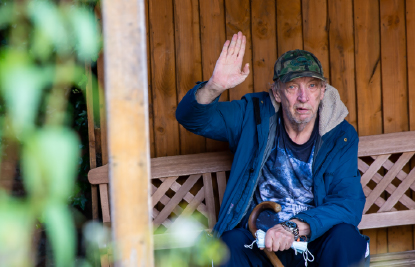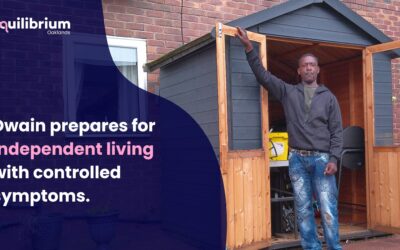Visitors Pod


The pod allows for off unit visits and can also double up as a safe designed area for visitors to be tested.
In recent months, it has been difficult to switch on the news without seeing the impact that the COVID-19 pandemic is having on the care sector. Reports of elderly residents unable to see their families for months on end, partners of fifty years not able to see each other except over FaceTime, people separated from their loved ones with little end in sight. And few areas of the social care sector have been hit harder than the already challenging area of dementia care. For people with dementia, maintaining regular contact with the people in their lives has shown to be beneficial for both mental and physical health.
Yet, for many people who require care after contracting COVID, contact with family is key to recovery. However, due to the nature of the virus, this basic requirement has been increasingly difficult for both care homes and hospitals to manage.
This problem has been a particular concern for the team at Moston Grange Care Home in Manchester, with the need for additional testing and cleaning between each book visit adding to the pressure although faced by care home currently. We looked for an initiative solution to support those who live at Moston, to have as much access to their loved ones as possible.
The solution was a bespoke visiting pod. The purpose designed visiting pod has been built off site and can be transported to any location where it is needed, making it an ideal solution to the problem faced by the home. The pod allows for off unit visits and can also double up as a safe designed area for visitors to be tested. To reduced additional pressure on the staff within the home, the pod uses UV technology to automatically clean the room after use, ready for the next visit.
It is hoped that this latest innovation will be ground breaking for the residents at the home and for all the families who have been largely separated since March 2020 and will offer some relief for those who have found themselves isolated until a vaccine becomes widely available.
The home prides itself on finding creative ways to improve the lives of everyone who lives there and this latest project more than fits the bill!
Related Articles
Navigating Dementia: Chris & Jackie’s Journey
Dementia is a growing concern in the UK, with around 1 million people currently living with a form of dementia1. The financial burden is significant—dementia care costs the UK £36.7 billion annually, with social care alone accounting for £16.9 billion. For individuals and their families, the impact is equally profound, with the average person spending £100,000 on dementia care over their lifetime2. Jackie’s story Chris Wells agreed to share his and his wife Jackie’s story with us and their...
Dwain prepares for independent living beyond Oakland House.
I’m Dwain, and I’ve been living at Oakland House for a while now. I suffer with psychosis, but my symptoms are under control with medication. Life hasn’t been easy for me. Growing up I lacked the stability I needed which had an impact on more than just my mental health. At Oakland House, I have the freedom to come and go as I please, with my own pass to enter and leave as I like. The team here helps me to consider the impacts of my choices, and I’m learning to make some better decisions. I’m...
Admission avoidance and medication management.
Meet Marie* who for many years managed her with the help of the Community Mental Health Team (CMHT), lived independently and had a well-established career as a chemist. In 2019, everything changed for Marie when she stopped responding to her medication. This led to her being admitted to hospital and, upon discharge, a new chapter at Oakland House. Marie’s psychotic symptoms are acute. She experiences distressing auditory, visual, olfactory and tactile hallucinations. To deliver a high standard...




